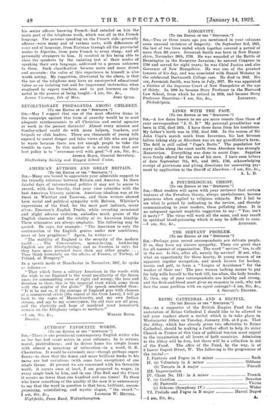AMERICAN AUTHORS AND GREAT BRITAIN. [To THE EDITOR OF THE
" SPECTATOR."] SIR,—Many are bound to appreciate your admirable support to the friendly relations between Britain and America. In these fateful days of international politics it may not be amiss to record, with due brevity, that your view coincides with the best American literary opinion. American idealism was at its finest in Whittier and Emerson, and these writers showed keen social and political sympathy with Britain. Whittier's expressions of the kind, for the most part indirect, occur often; Emerson's English Traits, while revealing occasional and slight adverse criticism, embodies much praise of the English character and the vitality of its American kinship. These utterances are always emphatic. The following may be quoted. He says, for example: "The American is only the continuation of the English genius under new conditions, more or less propitious." Again, lie writes :—
" The stability of England is the security of the modern world. . . . The Conservative, money-loving, lord-loving English are yet liberty-loving; and so freedom is safe; for they have more personal force than any other people. . . . They think humanely on the affairs of France, of Turkey, of Poland, of Hungary.
In a speech made at Manchester in November, 1847, lie spoke as follows:—
"That which lures a solitary American in the woods with the wish to see England is the usual peculiarity of the Saxon race; its commanding sense of right and wrong; the love and devotion to that; this is the imperial trait which arms them with the sceptre of the globe." The speech concluded thus: " If it be not so, if the courage of England goes with chances of a commercial crisis [the repeal of the Corn Laws], I will go back to the capes of Massachusetts, and my own Indian stream, and say to my countrymen, the old race are all gone, and the elasticity and hope of mankind must henceforth remain on the Allegheny ranges or nowhere."
Dundee.


































 Previous page
Previous page